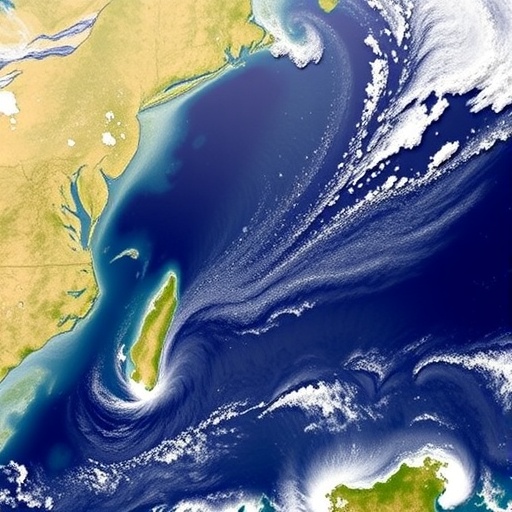A Silent Shift: How a Slowing Atlantic Ocean Currents Threaten Tropical Rainfall and Fuel Future Droughts
The future of tropical rainfall under a warming climate has long been shrouded in uncertainty. Central to this ambiguity lies the elusive behavior of the Atlantic Meridional Overturning Circulation (AMOC)—a massive system of ocean currents that redistributes heat and carbon across vast distances. New research now reveals that a slowdown in this crucial circulation could trigger sweeping changes in rainfall across tropical regions, raising the specter of intensified droughts in some of the world’s most vulnerable environments.
The AMOC acts as a vast conveyor belt in the Atlantic Ocean, drawing warm surface waters northward and returning cold, deep waters southward. Its health is pivotal for maintaining climate stability, especially in the tropics. Yet, despite significant effort, climate models have struggled to confidently predict tropical rainfall responses to potential AMOC weakening, owing to the complex interplay of atmospheric and oceanic forces involved. This new study breaks ground by elucidating the mechanisms through which an AMOC slowdown reverberates through tropical hydroclimate patterns.
By integrating state-of-the-art climate model simulations with insights drawn from paleoclimate records—particularly those from Heinrich Stadial 1 (HS1), a dramatic episode of abrupt AMOC weakening thousands of years ago—the researchers validate their theoretical framework. They show that pauses in the AMOC can propagate high-latitude cooling signals into the tropical North Atlantic, where they alter wind patterns and initiate cascading effects across the global tropics. This interdisciplinary approach establishes a compelling narrative linking past events with possible future scenarios.
Central to the study is the discovery that altered wind regimes over the tropical Atlantic serve as vital conduits for transmitting the cooling signal. Prevailing easterly and westerly winds carry chilled air masses from cooler northern latitudes deep into tropical and subtropical regions. These cold air incursions then drive shifts in sea surface temperatures, which in turn trigger far-reaching atmospheric responses, altering convective rainfall well beyond the North Atlantic basin.
These changes do not remain confined to the Atlantic. The modified wind and surface temperature patterns ripple across ocean basins, forging teleconnections with the Pacific and Indian Oceans. Air–sea interactions in these distant regions amplify and distribute the signal, reshaping rainfall distributions in locales as varied as Indonesia, the tropical Andes, and northern Australia. This web of connections reveals a previously underappreciated pathway through which high-latitude oceanic changes can exert outsized influence on tropical precipitation.
The implications of these findings are profound. Under projected global warming scenarios, the models consistently forecast a multi-model spatial pattern of hydroclimatic change driven by AMOC slowdown. Among the most alarming outcomes is widespread drying over Mesoamerica, the Amazon basin, and West Africa—regions already vulnerable to water scarcity and food insecurity. Increased drought frequency and intensity in these areas could imperil both ecosystems and human societies reliant on stable rainfall regimes.
What makes this study particularly groundbreaking is its ability to anchor future climate projections in paleoclimate evidence, thereby reducing uncertainty. Heinrich Stadial 1 offers a natural experiment for observing the real-world consequences of sudden AMOC weakening. By demonstrating close correspondence between model simulations and paleoclimate proxies during HS1, the researchers provide robust empirical support for the mechanisms they propose. This validation fortifies confidence in the projections of tropical drought risks in a warming world.
The study also confronts one of the lingering puzzles in climate science: the challenge of connecting high-latitude oceanic perturbations to tropical atmospheric outcomes. While previous research has identified broad correlations, the physical processes underpinning these links have remained elusive. Here, detailed analysis of wind patterns and air–sea feedbacks clarifies how the cooling signal progresses through the atmosphere and oceans to reshape rainfall.
This nuanced understanding sheds light on why projections of tropical rainfall under global warming have been so variable until now. By pinpointing the critical role of AMOC dynamics and their downstream atmospheric effects, the study provides a framework for interpreting divergent model behaviors. This advances climate science beyond statistical correlations into a realm of mechanistic clarity that offers tangible benefits for climate prediction and policy.
Moreover, highlighting the potential for AMOC slowdown to exacerbate drought risk invites renewed focus on monitoring and mitigating factors that influence Atlantic circulation. Human-driven influences such as greenhouse gas emissions, freshwater inputs from ice melt, and land-use changes could hasten AMOC weakening. Therefore, these findings underscore the urgency of curbing emissions and preserving oceanic and atmospheric stability to forestall cascading climate impacts.
Finally, the research calls for heightened preparedness in tropical regions vulnerable to drying trends. Water management, agricultural planning, and ecosystem conservation strategies will need to factor in these emerging risks. By integrating paleoclimate knowledge with modern simulations, policymakers and communities can better anticipate and adapt to forthcoming hydroclimatic shifts.
In conclusion, the discovery unfolded by DiNezio, Shanahan, Sun, and colleagues marks a significant leap in unraveling the complex web linking ocean circulation to tropical rainfall. Their work not only illuminates a pivotal climate mechanism but also issues a stark warning about the heightened drought hazards that a slowing AMOC could bring under global warming. As the world races against climate change, understanding and addressing these intertwined ocean-atmosphere processes will be critical to safeguarding the planet’s most cherished and vulnerable ecosystems.
Subject of Research: Tropical rainfall response to Atlantic Meridional Overturning Circulation slowdown and its implications for future drought risk.
Article Title: Tropical response to ocean circulation slowdown raises future drought risk.
Article References:
DiNezio, P.N., Shanahan, T.M., Sun, T. et al. Tropical response to ocean circulation slowdown raises future drought risk. Nature (2025). https://doi.org/10.1038/s41586-025-09319-x
Image Credits: AI Generated




